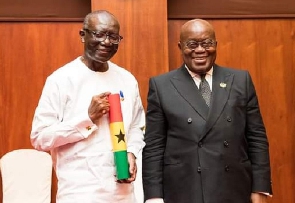Respected Economist and former New Patriotic Party (NPP) Member of Parliament (MP) for New Juaben South Dr. Mark Assibey-Yeboah has advised the Akufo-Addo-led administration to consider using a part of the $600 million received from the International Monetary Fund (IMF) to pay bondholders, creditors and increase the number of persons who are on the Livelihood Empowerment Against Poverty (LEAP) programme.
He argued that such payments would help restore confidence in the financial system, help with revenue mobilization and protect the most vulnerable against price hikes and the removal of subsidies on electricity.
“With USD600 Million disbursed by the Fund, we could ring-fence and apply part of the proceeds as follows:
1. Payment of Coupons/Principal of Bonds (and Cocoa Bills):
The Ministry of Finance projected an 85% Participation Rate in the Domestic Debt Exchange. This means that only 15% of individual bondholders, excluding Pension Funds and Cocoa Bills are ‘original’ bonds that have to be settled in the near term. The government needs to prioritise the payment of coupons/principal of the aforementioned bonds to restore confidence in the financial system. Currently, market players are interested primarily in 91-day Treasury Bills. Restored confidence will push investors to 182-day and 1-year Treasury Bills, giving the government some breathing space.
2. Servicing of Bilateral Debt:
Following the suspension of interest payments on Eurobonds and Bilateral loans, almost all critical infrastructure projects have grounded to a halt. Contractors have demobilised from site. Turnkey projects like the KATH Maternity and Children’s Block (@ 54% completion), Eastern Regional Hospital (@ 50% completion), Obetsebi Interchange (@ 90% completion), Nungua Beach Road (@ 80% completion), Takoradi PTC Interchange (@ 85% completion), Czech-Funded Bridges (@ 70% completion) amongst others are all being discontinued. We should resume interest payments on these critical loans. Doing so will give the contractors impetus to remobilize and go back to site, albeit, at an increased project cost.
3. Enhanced LEAP:
The gradual removal of ‘subsidies’ on electricity is biting the poor very hard. With food and energy inflation persisting, LEAP, our social protection program that provides cash transfers to very poor people must be enhanced and expanded,” he wrote in reaction to the receipt of the bailout cash by Government.
The government has indicated that the money, which forms part of $3 billion expected from the IMF, will go into budgetary support to help bring down inflation according to Finance Minister Ken Ofori-Atta.
The Government sought a bailout from the IMF last year to enable the balance of payment challenges
Business News of Wednesday, 24 May 2023
Source: mynewsgh.com

















